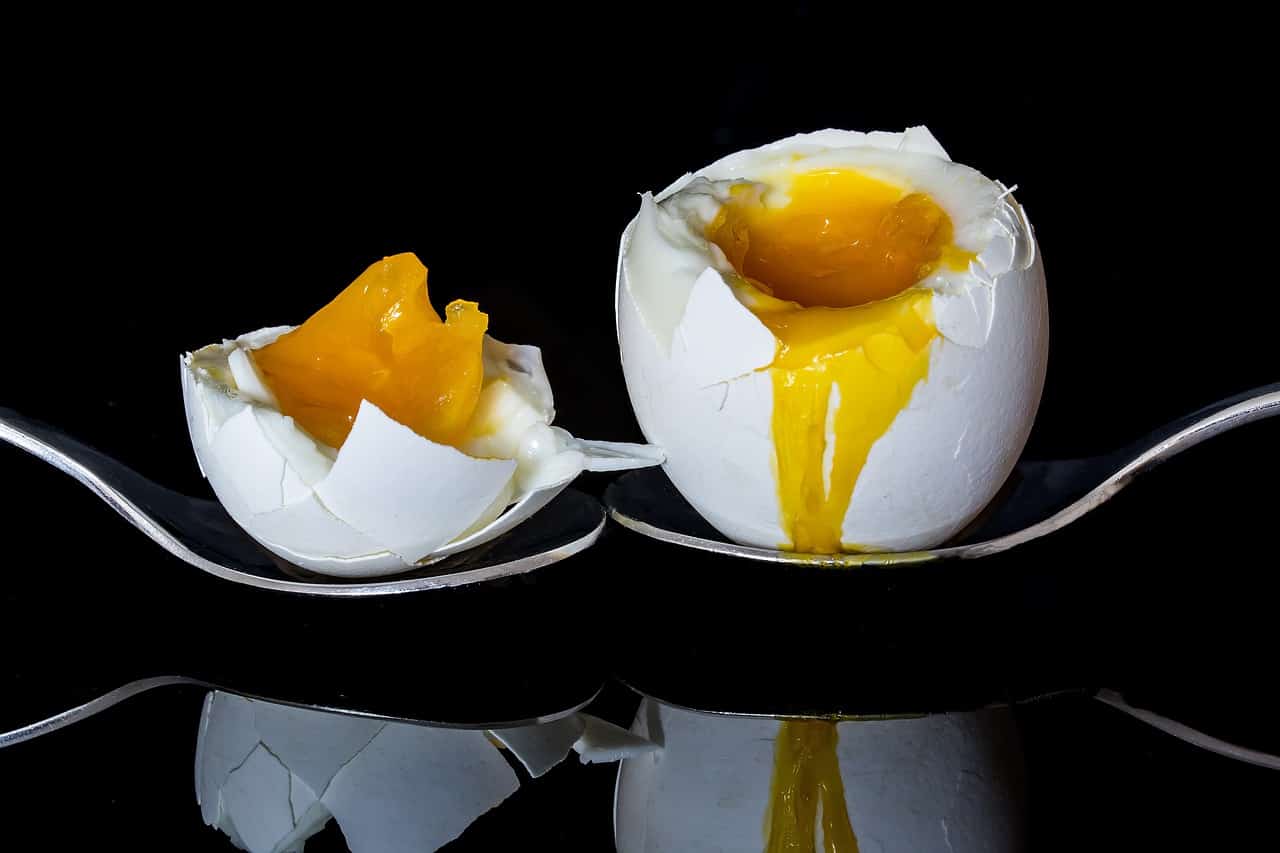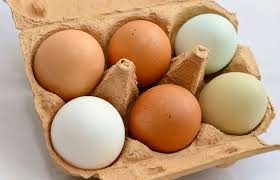Calories in Egg Hard Boiled

Calories in egg hard-boiled

When it comes to keeping track of your calorie intake, there are a lot of things you have to take into account. It can be tricky to make sure that you’re eating the right amount of calories, and not going over your daily limit. Like many, you may have grown up eating hard-boiled eggs. But if you’re looking for a low-calorie snack option, egg hard-boiled might be the right choice for you.
Eggs are high in protein and nutrients. They can be used in a variety of dishes and prepared in a variety of ways. Hard-boiling eggs are one way to enjoy them. Hard-boiled eggs make great salad toppings and can be eaten alone with a sprinkle of salt and pepper.
Everything you need to know about hard-boiled eggs is right here.
How many calories are in an egg?
Eggs contain protein and have important vitamins and minerals like calcium, potassium, and iron. This food is essential for the human body’s health and fitness system. Approximately 80 calories from an egg containing hard-boiled eggs are in it. Eggs are formerly regarded by many people as being a controversial food because they are concerned about cholesterol and saturated fats but research indicates eggs provide nutritional value. This article discusses the nutritional profiles of eggs along with new studies on how eggs can cause health problems.
Nutrition Facts
- Calories: 78
- Carbs: 0.6 grams
- Total fat: 5 grams
- Saturated fat: 1.6 grams
- Monounsaturated fat: 2.0 grams
- Cholesterol: 212 mg
- Fibre: 0g
- Protein: 6 grams
- Vitamin A: 6% of the Recommended Dietary Allowance (RDA)
- Vitamin B2: 15% of the RDA
- Vitamin B5: 7% of the RDA
Carbs
Most people are familiar with the basic nutrients found in eggs – protein, fat, and cholesterol. However, eggs also contain a small number of carbs. This is because eggs contain a small amount of glycogen, a type of sugar that is stored in the liver and muscles for energy.
This helps to give eggs their characteristic firm texture. While the carb content of eggs is relatively low, it’s important to be aware if you’re following a low-carb diet. Fortunately, plenty of other nutritious breakfast options are carb-free, such as bacon and avocado.
Fat
Egg fat, also known as cholesterol, is a substance found in eggs that helps to keep the yolk together and provides nutrients for the developing embryo. While egg fat is necessary for a healthy diet, it can also be detrimental to your health if consumed in excess.
High levels of egg fat in the diet have been linked to heart disease, stroke, and high blood pressure. For this reason, it is important to consume eggs in moderation and to choose egg products that are low in fat.
Egg whites are a good source of protein and are virtually fat-free, making them a healthier choice than whole eggs. When baking, you can also use egg substitutes that are made from egg whites or other healthy ingredients. By making these simple changes, you can enjoy the benefits of raw eggs without increasing your risk of health problems.
Protein
Protein is an essential part of a healthy diet, and eggs are one of the best sources of high-quality protein. Each egg contains 6 grams of protein, making them an ideal snack or meal option for those looking to boost their protein intake.
In addition to being a great source of lean protein, eggs are also packed with other nutrients such as vitamin D, iron, and choline. They are low in calories and fat, and they contain no sugar or carbohydrates. As a result, they are often included in weight loss and bodybuilding diets.
Eggs can be cooked in a variety of ways, making them a versatile and convenient food option. Whether they are boiled, scrambled eggs, or made into an omelette, egg consumption makes a delicious and nutritious addition to daily diet meals.
Health Benefits of Eggs

This snack will be nourishing, and delicious, and will help you with your health in the simplest form. Weight Loss Hardboiled eggs contain a good amount of fat. It fills you up without a lot of calories and helps you with weight loss. The protein from hardboiled eggs is also a good supplement for the development of pregnancy and helps promote health.
During pregnancy, they help to maintain the teeth, bones and growth. Boiled egg whites have better nutritional daily values as compared to the original form. When the water is warm, remove the egg yolks and enjoy a cold low-fat ice cream. Sources of cholesterol.
High in Cholesterol but, Do Not Increase the Risk of Heart Disease
An egg is a common breakfast choice but it’s often vilified because it’s high in cholesterol. One large egg has 186 mg of cholesterol, which is 62 per cent of the recommended daily intake. Despite their high cholesterol content, eggs do not appear to increase the risk of heart disease in the majority of people.
Some studies suggest that eggs may help prevent heart disease. Eggs are a good source of several nutrients that are important for heart health, including protein, vitamins B6 and B12, choline and antioxidants.
What’s more, eggs raise HDL (“good”) cholesterol levels more than they raise LDL cholesterol levels. For this reason, eggs have a favourable effect on the ratio of total cholesterol to HDL cholesterol, which is a strong predictor of heart disease risk. Therefore, although eggs are high in cholesterol, they don’t seem to adversely affect heart health or increase heart disease risk in most people.
Promote Brain and Eye Health
Eggs are one of the most nutrient-dense foods on the planet. They’re an excellent source of protein and contain many vitamins and minerals, including zinc, iron, and vitamins A, B12, and D.
Lutein and zeaxanthin
Eggs contain lutein and zeaxanthin, two important antioxidants that play a vital role in maintaining eye health. In addition, eggs are one of the few foods that naturally contain vitamin D. This essential nutrient helps to promote bone health and supports the immune system.
Choline
Eggs are also a good source of choline, a nutrient that is essential for brain development. Research has shown that choline plays a role in memory and learning. Furthermore, eggs have been shown to improve cognitive function in older adults. One study even found that eating just one egg per day for six weeks improved cognitive performance in healthy young adults.
So, if you’re looking for a nutritious food that can help to promote brain and eye health, eggs are a great choice.
Hard-Boiled vs Fried Egg
When it comes to preparing eggs, there are two main methods: hard-boiling and frying. Each method has its benefits and drawbacks, so it’s important to choose the right one for your needs.
Hard-boiled eggs
Hard-boiled eggs are cooked in boiling water until the whites and yolks are solidified. This method is quick and easy, and it produces a consistent result. However, hard-boiled eggs can be difficult to peel and sometimes have a rubbery texture.
Fried eggs
Fried eggs are cooked in hot oil until the whites and yolks are solidified. This method allows you to control the level of doneness, but it can be messy and time-consuming. Fried eggs also tend to be higher in fat and calories than hard-boiled eggs.
Nutrition
Added nutritional value in a large egg contains: What should be considered as eggs can cause high cholesterol as they contain saturated fats. It is good to have a healthier way to prepare your eggs. When fried eggs increase the number of calories they contain, boiling preserves their best benefits in a large proportion.
Allergies
An egg allergy is the largest allergy in children. Anaphylactic shock and severe pain can appear or occur. If you think eggs are allergic you should consult a qualified medical practitioner whose advice directly relates to your situation. There are varying levels of allergies in eggs and yolks. A bird’s egg allergy may also mean you also have a chicken allergy. Managing egg allergies is difficult because a large number of products are crafted out of eggs.
Adverse effects
Some have concerns regarding dietary cholesterol in eggs, but the cholesterol found in blood cholesterol is different (188 mL in an egg). Current scientific evidence indicates that high cholesterol levels may increase your risk for heart disease. Reduce your saturated or trans-fatty acids to maintain a normal cholesterol level.
Varieties
There are many different types of eggs available on the market today. The most common type of egg is the chicken egg, but there are also duck, goose, quail, and turkey eggs. Each type of egg has its unique flavour and texture. Chicken eggs are the most versatile and can be used in a variety of dishes. Duck eggs have a richer flavour and are often used in baking or made into fritters. Goose eggs are very large and have a milder flavour than chicken eggs. Quail eggs are the smallest type of egg and have a delicate flavour. Turkey eggs are the largest type of egg and have a slightly gamey flavour. No matter which type of egg you choose, you’re sure to enjoy a delicious and nutritious meal.
Difference between brown and white eggs

Eggs have various shapes and sizes. They are big, small thumb size, dark brown, bluish-white pinkish white or spot. Brown and white chicken egg are the commonest in the supermarket.
Brown and white eggs are often seen as interchangeable, but there are a few key differences between them. For one thing, brown eggs tend to be larger than white eggs, and they also have thicker shells.
Brown eggs tend to be slightly more expensive than white eggs. But what about the taste? While there is no definitive answer, some people believe that brown eggs have a richer flavour, while others say that there is no difference at all. Ultimately, it comes down to personal preference. So whether you prefer brown or white eggs, you can rest assured that either option is delicious.
How Long to Boil Eggs?
It all depends on how you like your eggs and what type of egg you are boiling. For a soft-boiled egg, the water should be at a rolling boil and then the eggs should be cooked for 3-5 minutes.
For a hard-boiled egg, the water should be at a rolling boil and then the eggs should be cooked for 8-10 minutes. Many factors can affect the cooking time such as the size of the pot, the number of eggs being boiled, and the altitude.
The best way to ensure that your eggs are cooked to your liking is to use a timer. Soft-boiled eggs are often served in an egg cup with the yolk spooned out on top of toast. Hard-boiled eggs can be served whole or sliced and are often used in salads or as a garnish.
How to Make Soft-Boiled Eggs
Making the perfect soft-boiled egg is an art. The key is to cook the egg until the whites are set but the yolk is still runny. This can be tricky to master, but with a little practice, you’ll be able to make soft-boiled eggs that are perfectly cooked every time. Here’s how to do it:
First, start by bringing a pot of water to a boil.
Then, gently lower your eggs into the water using a spoon. If you’re making more than one egg, be sure to space them out so that they have room to cook evenly.
Once the eggs are in the water, set a timer for three minutes. At the three-minute mark, remove the eggs from the heat and transfer them to a bowl of ice water.
This will stop the cooking process and help to set the yolks. After about two minutes in the ice water, your eggs should be ready to eat.
Gently tap each egg on a hard surface to crack the shell, and then peel it away. The perfect soft-boiled egg will have firm whites and a runny yolk that’s just waiting to be devoured.
How to Boil Eggs in the Microwave
Simply place the eggs in a microwave-safe bowl or container and add enough water to cover them. Then, microwave the eggs on high for three minutes.
After three minutes, remove the eggs from the microwave and let them sit in the hot water for an additional three minutes.
This will allow the heat to continue cooking the eggs through. Finally, carefully remove the eggs from the water and peel them. And that’s it! You now have boiled eggs that were cooked entirely in the microwave.
Conclusion
Eggs are a nutrient powerhouse. Eggs contain protein and have important vitamins and minerals like calcium, potassium, and iron. This food is essential for the human body’s health and fitness system. Calories in egg hard-boiled can range depending on how they are prepared. On average, a hard-boiled egg has 77 calories and a soft-boiled egg has 71 calories. The number of calories in an egg hard boiled can also be affected by the addition of other ingredients, such as butter or mayonnaise.
FAQ’s
Are 2 hard-boiled eggs good for weight loss?
Eggs contain a high amount of proteins. Protein helps in fat loss as it is very nutrient dense and eggs are an excellent protein, supplying 6 grams a serving each. A protein diet is 0.8g / kg a day.
How much KCAL does 1 hardboiled egg have?
The amount of calories in a hardboiled egg depends on its size. A small egg has about 78 calories, a medium egg has about 88 calories, and a large egg has about 103 calories. An extra-large egg has about 114 calories, and a jumbo egg has about 124 calories.
Is boiled egg better for weight loss?
Eggs are a low-calorie food, usually, egg meals are composed of two–4 eggs. Three small cooked eggs contain little to no fat and contain no fat. If you include vegetables in your daily meals, you have a full meal of 500 calories.
How many calories are in 4 boiled eggs?
The amount of calories in 4 boiled eggs is about 352. This is because 4 small eggs have about 312 calories, 4 medium eggs have about 352 calories, and 4 large eggs have about 412 calories.
What is the nutritional value of a hardboiled egg?
A hardboiled egg is a good source of protein, iron, and vitamin D. It also contains choline, which is important for brain health.
How to make soft-boiled eggs?
Soft-boiled eggs are delicate; they are difficult to digest. Take them away 1 minute too soon and your eggs are hardly holding their shape. But when you give them another minute or so it can be very hard-boiled. The most popular method is the soft-boiled egg wrapped with a meaty layer and resulting in a tasty egg centre.
